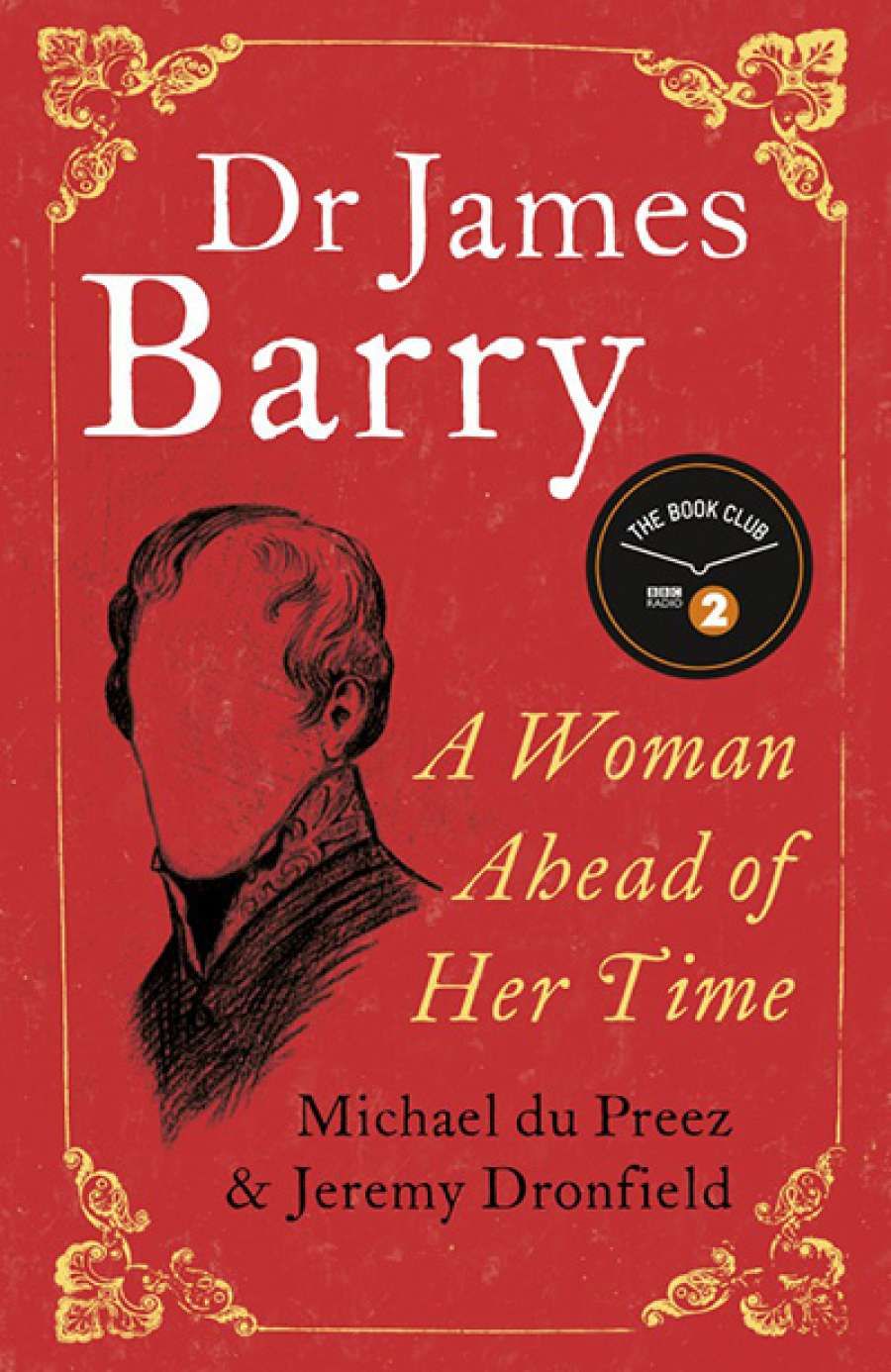
- Free Article: No
- Contents Category: Biography
- Custom Article Title: James Dunk reviews 'Dr James Barry: A woman ahead of her time' by Michael du Preez and Jeremy Dronfield
- Custom Highlight Text:
‘The devil! It’s a woman!’ exclaimed a charwoman as she laid out the naked body of James Barry, MD, for burial. Seventy-six years earlier, Barry had been born ...
- Book 1 Title: Dr James Barry
- Book 1 Subtitle: A woman ahead of her time
- Book 1 Biblio: Oneworld Publications $35.99 hb, 492 pp, 9781780748313
After James Barry was exposed, the Medical Times and Gazette and Lancet ran short articles about the woman who had become an officer and surgeon. Soon afterward, Charles Dickens, with his compassionate eye and relish for eccentricity, wrote a short account of Barry’s life. Barry was studied in other short pieces before a full-length biography was published in 1958. In 2003, historian Rachel Holmes furnished him with another biography, Scanty Particulars: The scandalous life and astonishing secret of Queen Victoria’s most eminent military doctor, before it reappeared four years later, with a less Victorian title: The Secret Life of Dr James Barry.
At first glance this is a transgressive gender story, perhaps even a transgender one. In Dr James Barry: A woman ahead of her time, however, Michael du Preez and Jeremy Dronfield write Margaret Bulkley as a young woman masquerading as a man so that she could learn medicine to participate in a coming Venezuelan revolution. The actual moment of decision when, with her progressive friends and anxious mother, she conceived the plan remains a marvellous unknown. The second half of the mystery, however, is the main subject of the book. How did this woman maintain the guise of a man? Did people know but not say anything? Perhaps it was too difficult to imagine, so that the swirling rumours about Barry’s effeminacy were cruel but credulous – jokes crafted on the premise that James Barry could not possibly be a woman. Or perhaps there was no vocabulary with which to ‘out’ Barry; no way in which to say to a man that, despite his successful practice of medicine, he was a woman.
The book is testament to a decade’s careful research by Michael du Preez, a retired surgeon. Its engaging manner, identified by two dust-jacket blurbs as ‘verve’, is the work of Jeremy Dronfield, a ghostwriter and ‘book-doctor’ who has helped to cure other projects: a covert pilot behind the eastern front; a female Russian aristocrat and spy; a murdered art doyen and possible spy.
Although the content of Dr James Barry is sometimes bleak, the tone is light, even jovial. Du Preez and Dronfield recount Barry’s life by artfully skipping between moments that can be isolated from the stream of history: a red-haired girl standing on the dock in a bonnet and muffler; the Lord Cathcart carving through the waves outside Plymouth; the quiet cocking of a pistol at dawn; carriages pulling into Buckingham palace for a levée. Many of these moments are reconstructed painstakingly from the pieces of information about Barry scattered through his writings and people’s descriptions of him; other events are recreated from oblique descriptions penned by those who travelled similar paths. This patchwork effect produces an extraordinary sense of the past, so that the book is a medically inflected excursion through the islands of the second British Empire.
 Photograph Dr. James Barry with servant and dog (Wellcome Images/Wikimedia Commons)Du Preez and Dronfield do well not to overwrite Barry’s life: they open up his world, capture much of his character through deft biographical work, and then leave us to make what we may of him. Perhaps it was not bewilderment but sympathy that protected Margaret Bulkley. Three officers, we read, stumbled upon Barry while he was ill in bed and saw that he was a woman, yet remained silent. Barry also charmed a series of powerful patrons who worked hard to smooth his career path. Perhaps they knew, and for private reasons supported the project.
Photograph Dr. James Barry with servant and dog (Wellcome Images/Wikimedia Commons)Du Preez and Dronfield do well not to overwrite Barry’s life: they open up his world, capture much of his character through deft biographical work, and then leave us to make what we may of him. Perhaps it was not bewilderment but sympathy that protected Margaret Bulkley. Three officers, we read, stumbled upon Barry while he was ill in bed and saw that he was a woman, yet remained silent. Barry also charmed a series of powerful patrons who worked hard to smooth his career path. Perhaps they knew, and for private reasons supported the project.
Perhaps the most striking passage involves our gendered expectations. Late in his life, James Barry took leave from his responsibilities in Corfu and travelled to Turkey to observe the Crimean War. The authors evoke the image of a slight man (who we know, but sometimes forget, is a woman), riding unsupported into a war zone, for personal interest. It is a vision of trespass and liberation.
Barry was hardly an advocate for women’s liberation. We glimpse this when, during his Crimean tour, he chanced upon the famed Florence Nightingale. He saw a privileged woman standing in her own right in this male sphere, and gave her a severe dressing down for not protecting herself against the sun. Nightingale was incensed, writing later that he was ‘the most hardened creature I ever met’. It seems apt. Margaret Bulkley’s life, in the hands of du Preez and Dronfield, was a long act of private contortion.


Comments powered by CComment